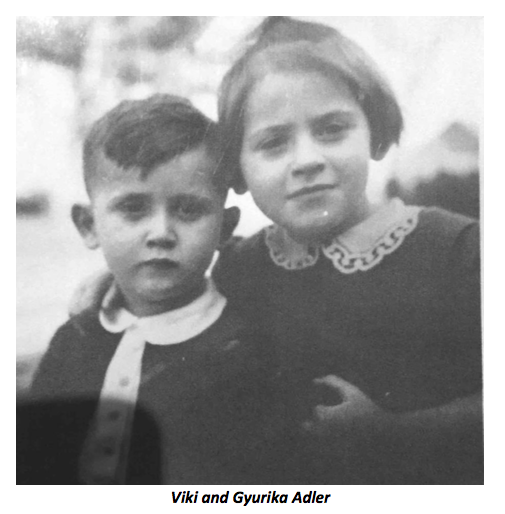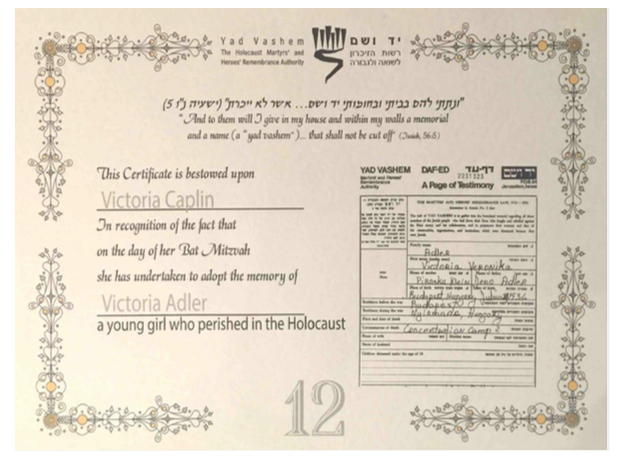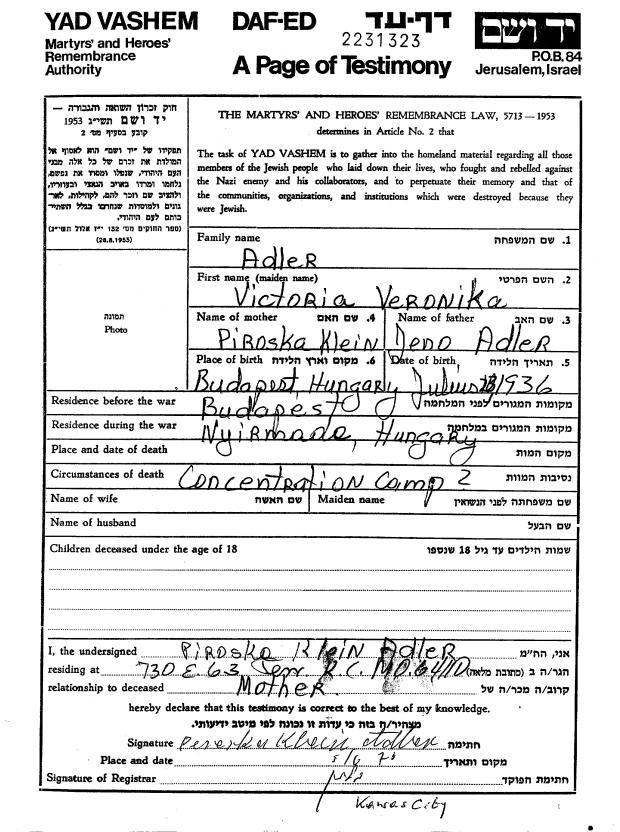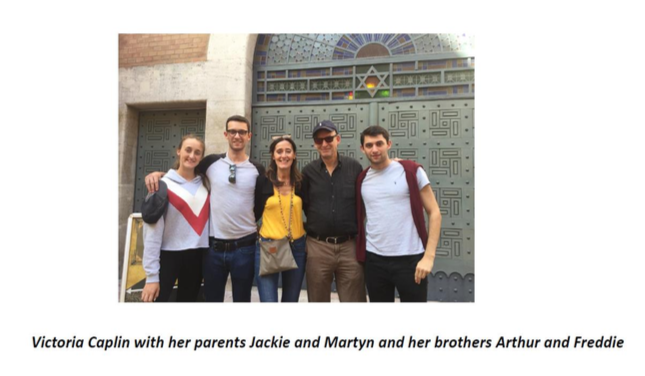
Courtesy of Yad Vashem


Courtesy of Yad Vashem


Courtesy of Yad Vashem


Courtesy of Yad Vashem

Twinning Program Connects British Schoolgirl to the Fate and Family of Young Holocaust Victim
Two years ago, British schoolgirl Victoria Sarah Galia Caplin began a journey whose ending she could never have imagined. Just before her Bat Mitzvah in the summer of 2015, she and her parents decided to mark this special milestone in her life by remembering a young Jewish girl who had been murdered in the Holocaust and was not lucky enough to celebrate her own Bat Mitzvah.
"I had heard about Yad Vashem's Bar/Bat Mitzvah Twinning program, and decided to get in touch with Yad Vashem to ask for more information," recalls Victoria's mother, Jacqueline. "A week later, a large envelope came through the door. Inside was a folder, which contained a Page of Testimony that gave us the details of a young girl with the same first name as my daughter and who Yad Vashem matched Victoria with for her Bat Mitzvah twinning."
The Page of Testimony was in memory of Victoria Veronica Adler, who was born in Budapest, Hungary, on 28 July 1936. During the war she and her parents, Piroska (née Klein) and Jeno Adler, lived in a town called Nyirmada. Other documentation provided by Yad Vashem indicated that Piroska had survived the war, as she had signed her daughter’s notification of death.
Alongside a beautiful certificate congratulating Victoria Caplin on marking her Bat Mitzvah in such a meaningful way was information about the different towns in the Nyirmada environs, where a large number of Jews lived before the war.
Unlike many other children who have taken part in the Bar/Bat Mitzvah Twinning program, however, this wasn't the end to Caplin's Bat Mitzvah journey. "In some respects, my journey had just begun," says Victoria. "My parents and I discussed going to Budapest to trace a little of Victoria Adler’s history. In preparation for the trip, about 18 months after my Bat Mitzvah, I took out the folder from Yad Vashem to review the information again. My father noticed that the submitter of the Page of Testimony in her name had written in small letters 'Kansas City, USA'."
When Victoria's father, Prof. Martyn Caplin, typed "Piroska and Jeno Adler" and "Kansas City" in a Google search, he was astonished to find a memorial at the Kehilath Israel Synagogue in Kansas City with a message reading "Piroska and Jeno Adler, remembered by children and grandchildren." Jacqueline immediately emailed the Kansas synagogue, telling them about her daughter's twinning with Victoria Adler and asking if they knew of any living relatives of the family. To their surprise, within the hour they had an answer: a member of the congregation – Erika Adler Clayman – had lost a sister called Victoria in the Holocaust. They provided the Caplins with Clayman's email address and the family made contact with her straight away. Clayman was extremely moved to hear from the Caplins: she told them that that very week she was marking her mother's Yahrzeit, day of passing, and felt Piroska had somehow "had a hand in this from on high."
Erika Adler Clayman was born two years after the end of the war. Miraculously, her parents Piroska and Jeno survived Auschwitz and its labor camps, and went on to be blessed with three more children: Erika, her sister Zsuzsi, and a brother called Gabor.
Clayman provided the Caplins with some additional details of Victoria (Viki) Adler's fate. After Jeno had been taken away for forced labor in the Hungarian army, Piroska moved back to Nyirmada with her daughter Viki and son Gyurika to be with her extended family. When rumors began to swirl about an imminent German invasion, Piroska travelled to relatives in Budapest to see if they could move there. During her few short days away, the entire town of Nyirmada, including Viki, Gyurika and the rest of her family, was rounded up into the town’s synagogue and transported to Auschwitz. Gyurika did not survive the journey; Viki was sent immediately to Birkenau, where she was murdered.
After the war, Jeno and Piroska found each other, and moved to Budapest, where Erika, Zsuzsi and Gabor were born. With the onset of the Hungarian Revolution in 1956, the family fled by boat to America. After many hardships and struggles, Jeno finally realized his dream of opening a kosher butchery. Erika and Piroska went to Israel a number of times to see if they could find out any more details about Viki, but unfortunately their searches remained fruitless. Of course, Erika never knew her older siblings, but her mother had kept some photos of them, which Clayman mailed to the Caplins in London, along with details of the fate of other family members.
The Caplins were so stirred by Clayman's account, that this summer they decided to go on a "roots journey" to Hungary, in honor of Viki Adler's short life. They visited the Budapest synagogue where Clayman and her family worshipped, and traveled almost four hours to Nyirmada and another village called Kisvarda near the Romanian border, where Adler's relatives had lived.
"Visiting those places made me so sad," remembers Victoria Caplin. "First because of what happened there during the war, and also at the loss of the local Jewish culture – it felt 'sanitized.' The locals were unfriendly, and I wondered if they even know what had happened there during the war. My father recited kaddish at the Jewish cemeteries in Kisvarda and Nyirmada. More strengthening, however, was when we came to the site of the old synagogue in Nyirmada, which is now a civic center. There was a plaque recognizing the site of the synagogue, where Dad said not only kaddish but also a memorial prayer for the victims of the Holocaust. It was both poignant and uplifting: The Nazis wanted to destroy the Jewish people and culture, and here we were, celebrating our Jewish lives and remembering Victoria Adler and her family.
"I am so grateful to my parents for allowing me to take part in the amazing Yad Vashem Twinning Program. To have shined a light on Viki and her brother Gyurika, and bring their memory back has been incredibly moving for me and I hope it has somehow given Erika and her family comfort that her siblings are not forgotten. The twinning of my Bat Mitzvah to Viki AdIer has been an incredible journey as well as a privilege, and underlines how important it is to remember not only the history of the Holocaust, but also those individual and family stories that tragically make up that history."
For more information about Yad Vashem's Bar/Bat Mitzvah twinning program, please contact: lucila.gleicher@yadvashem.org.il.











